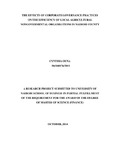| dc.description.abstract | Non governmental organisations play a vital role in every society, in many cases directly impacting on
the quality of people’s lives. Good corporate governance can offer a number of important benefits to
non governmental organisations this includes ensuring that non governmental organisations develop
better strategies and plans as well as improve operational effectiveness. In addition, organisations with
good corporate governance usually have good stakeholder engagement and communication flow.
Finally, good corporate governance ensures that there is an increased likelihood that the organisation
will deliver on its purpose and do so efficiently.
The purpose of this study was to examine the effects of corporate governance practices on the
efficiency of local agricultural NGOs in Nairobi county. To achieve this objective the study used a causal
design study. The population was 228 registered local NGOs from which a sample of 90 was taken using
simple random sampling. Primary data was collected through a structured questionnaire using the Likert
measurement scale that was administered to the 90 local NGOs. DEA was used to measure efficiency of
the local agricultural NGOs. The data collected was then analysed using a linear regression model to test
the extent of relationship.
The study established that the majority of the NGOs had implemented the four corporate governance
practices that is, board size and composition, board meetings, audit committee and transparency and
disclosure. When regression analysis was conducted on each of the four corporate governance
practices, separately, there was a positive relation with organisation efficiency. Overall, board size had
the greatest effect on the efficiency of the NGOs sampled while transparency and disclosure had the
least effect to efficiency. The study also revealed that the local sampled NGOs were highly efficient with
an average DEA coefficient of 0.756 although some were operating below average with the lowest DEA
coefficient having 0.343. Discussion of the results largely shows consistency with some empirical studies
as well as theory.
The study recommends training of local NGO board members and management to understand the
importance of corporate governance so that they can apply these practices in their organisations. Other
implications and recommendations for policy and practice are also provided | en_US |

